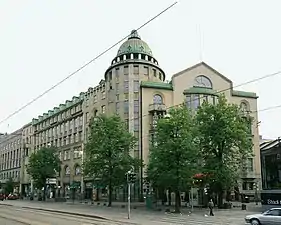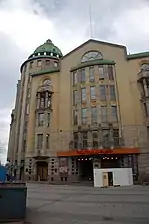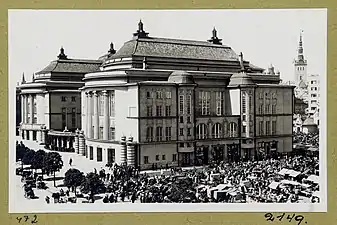Wivi Lönn
Wivi Lönn (20 May 1872 – 27 December 1966), born as Olivia Mathilda Lönn, was a Finnish architect. She was the first woman to be awarded the honorary title of "Professor" by the Finnish Association of Architects.[1]
Wivi Lönn | |
|---|---|
 | |
| Born | Olivia Mathilda Lönn May 20, 1872 |
| Died | December 27, 1966 (aged 94) |
| Nationality | Finnish |
| Occupation | Architect |
| Awards | Architectural prize of School of Economics of Tampere, title of "Professor" by the Finnish Association of Architects |
| Buildings | Estonia Theatre |
| Projects | Uusi Ylioppilastalo |
| Design | Sodankylä Geophysical Observatory |
Early life and education
Olivia Mathilda Lönn was born in the village of Onkiniemi, near Tampere on May 20, 1872.[2] Her father was Wilhelm Lönn, a local brewer, and her mother Mathilda Siren.[2] After graduating from the Industrial School of Tampere she moved to Helsinki. From 1893 to 1896 she studied architecture at the Polytechnic University of Helsinki. During the same period, she won first prize in several architectural competitions.[1] During her life she developed a close friendship with Hanna Parviainen, with whom she collaborated many times.
Later career
Her graduation from the university was followed by the establishment of her architectural office, making her the first independently practising female architect of Finland.[1][3] In 1904 she won the first architectural prize in a contest of the School of Economics of Tampere.[3] From 1909 to 1913 Wivi Lönn and Armas Lindgren designed and built the Estonia Theatre in the Art Nouveau style, and the Uusi Ylioppilastalo.[4] In 1913 she moved to Jyväskylä, where she developed several architectural projects, among them a school, a factory, and several other buildings. In 1913 the Sodankylä Geophysical Observatory, designed by her, was also completed.


In the 1910s she designed the mansion in Jyväskylä of Alvar Aalto, a well-known Finnish architect. The project was finished in 1915.[5] In the 1920s she cooperated with Hanna Parviainen in many architectural projects in the area of Jyväskylä, such as nursery schools, health care stations, a church and a library. At the same time she designed and built the headquarters of the Young Women's Christian Association (YWCA) in Helsinki. In 1945 the Sodankylä Geophysical Observatory, designed by her, was also completed. In 1956 she became the first woman to be awarded the honorary title of the "Professor" by the Finnish Association of Architects.[1]
Wivi Lönn died on December 27, 1966 in Helsinki.
In 2010, sculptor Sonja Vectomov unveiled a remarkable statue of Lönn[6] at the center of a private park facing Lönn's own erstwhile mansion,[7][8] the outline of which appears on its pedestal (an obscure reference to Lönn's use of the same outline on a doghouse she had designed).[8]
Notable buildings

 Uusi Ylioppilastalo (The New Student House), 1910
Uusi Ylioppilastalo (The New Student House), 1910 Uusi Ylioppilastalo, front
Uusi Ylioppilastalo, front Korp! Sakala convent, 1911, hit by a flame bomb in 1941 that left only the walls standing, renovated heavily after
Korp! Sakala convent, 1911, hit by a flame bomb in 1941 that left only the walls standing, renovated heavily after The original Estonia Theatre before it was heavily damaged, 1913
The original Estonia Theatre before it was heavily damaged, 1913
She also designed the now dismantled main building of Sodankylä Geophysical Observatory in 1945.
See also
References
- "Über das Projekt - Frauengeschichte". uni-ulm.de. Retrieved 2017-09-15.
- Suominen-Kokkonen, Renja (29 May 2018). "Lönn, Wivi (1872 - 1966)". Kansallisbiografia. Retrieved 24 June 2020.
- Dainty, Andrew; Green, Stuart; Bagilhole, Barbara (2007). People and culture in construction: a reader. Routledge. pp. 161–62. ISBN 0-415-34870-6.
- O'Connor, Kevin (2006). Culture and customs of the Baltic states. Greenwood Publishing Group. p. 220. ISBN 0-313-33125-1.
- Suomen Taideteollisuusyhdistys (2001). Form function Finland. University of Michigan.
- Joenniemi, M., "10 syytä rakastaa naisarkkitehtia", Yle, Mar. 6, 2015.
- Siilahti, A., "Sonja Vectomov tanssittaa pronssia", Etelä-Suomen Sanomat, Feb. 15, 2010.
- Kenkä, "Jyväskylä: Wivi Lönn Walk", Walk Finland (blog), Jun. 19, 2012.
External links
![]() Media related to Wivi Lönn at Wikimedia Commons
Media related to Wivi Lönn at Wikimedia Commons